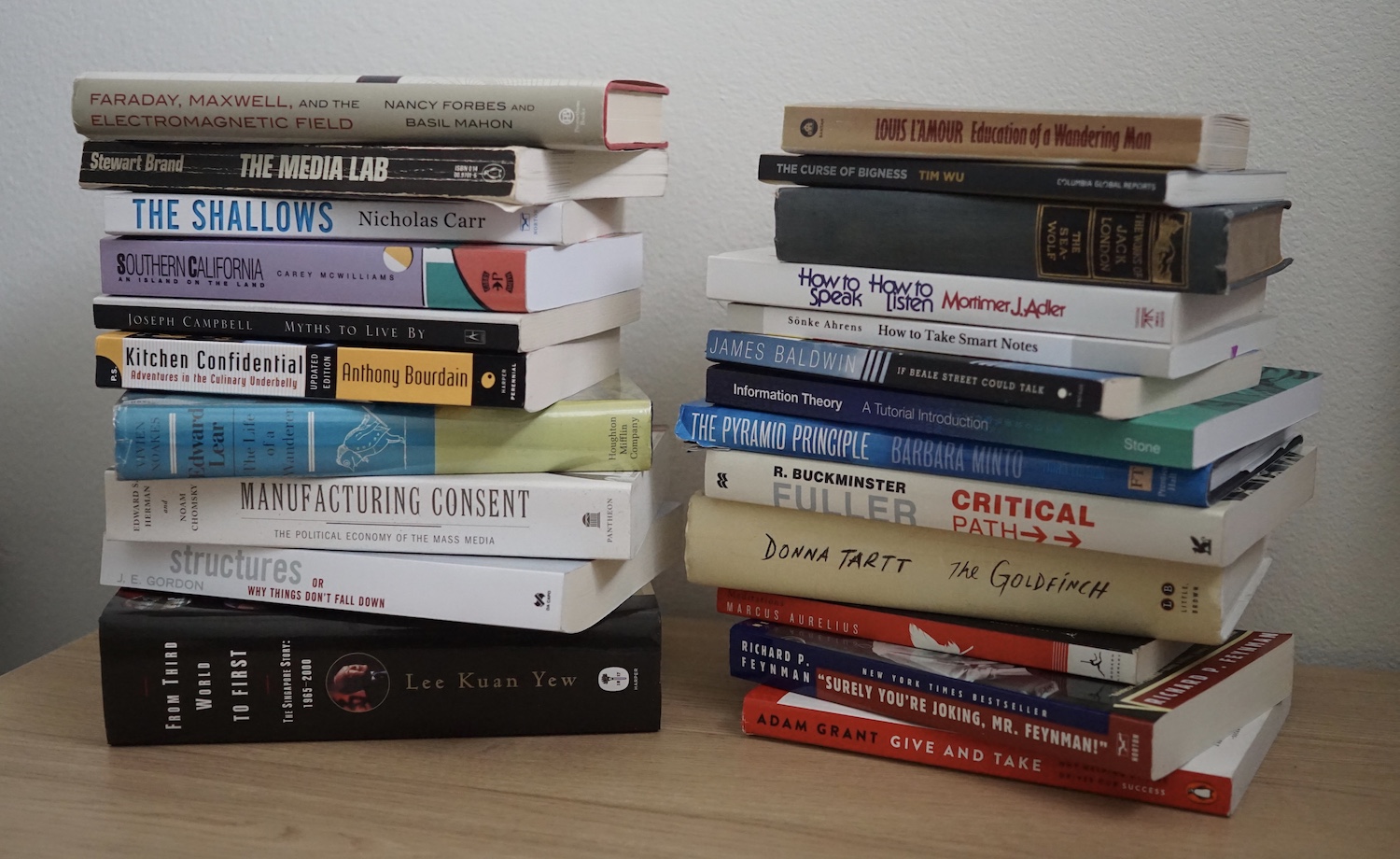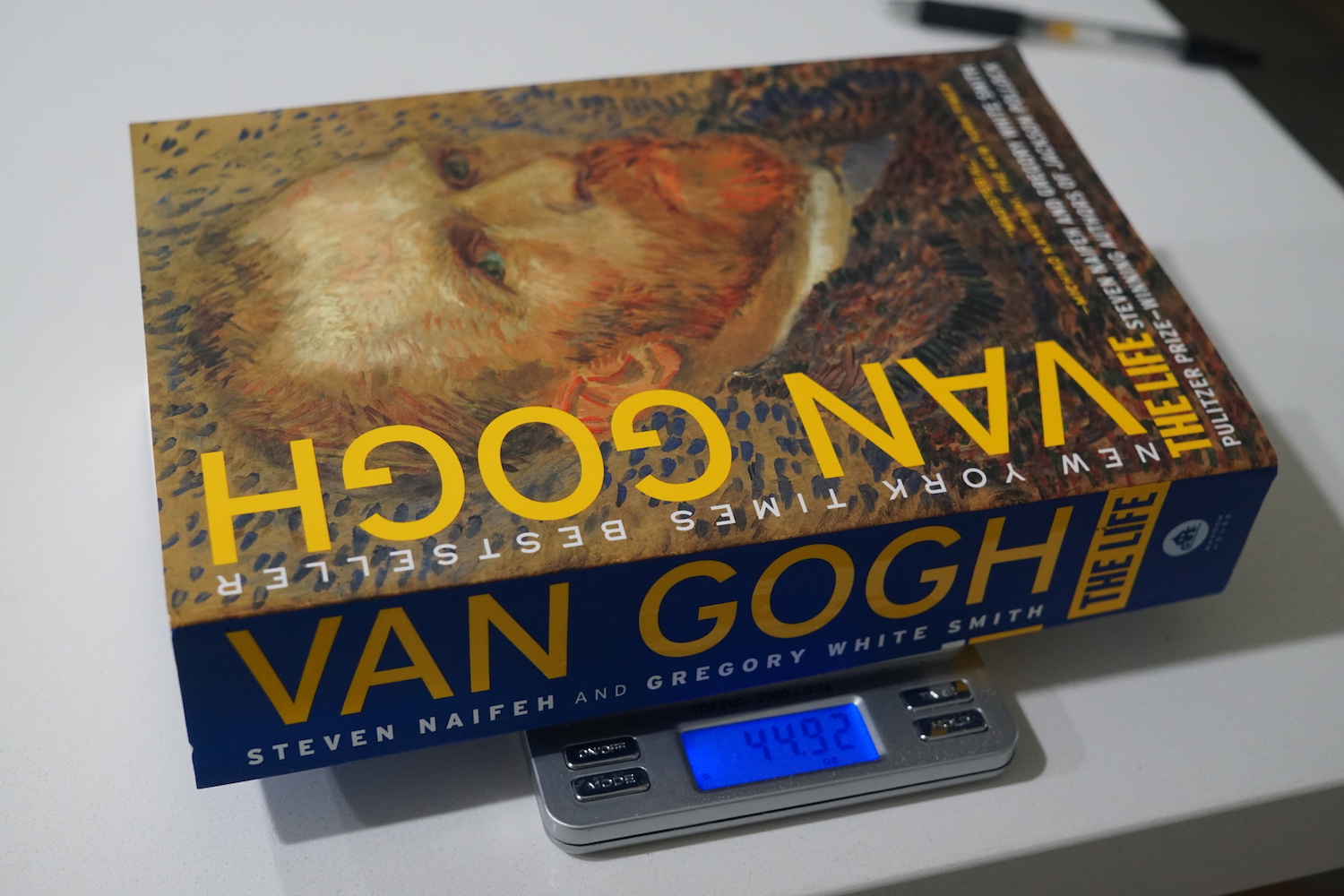Five Rules to Read More Books

Reading a book is a big ask. Not only is it a large time commitment, the payoff is unknown. Sometimes it’s a big win. Occasionally it’s a waste.
As I’ve struggled to read more over the past four years, I’ve developed five rules that have helped me to dramatically increase my reading output and overall reading enjoyment.
- Read physical books
- Acquire indiscriminately
- Read spontaneously
- Read several books at once
- Quit early
These rules have helped me to both read more, and to read more broadly. By matching books to topics, questions, and areas of interest that are top of mind, I’ve been able to sustain a high level of reading pleasure, while tactically educating myself on topics of personal and professional relevance.
Read Physical Books
I’ve gone through stints of reading on the Kindle or listening to Audiobooks. Unfortunately, I’ve found limited success with both. There is something incredibly powerful about the tactile feeling of a physical book and I find that being able to flip through pages to gain context, make notes, and highlights in the margins, and physically see a book’s presence in my apartment make them superior to digital alternatives.
I’ve also found that my retention has significantly increased with the switch to old-fashioned books. It’s unclear the root cause, but I did have multiple experiences listening to books where I could barely remember the title at the end. It was sort of like trying to recall the landscape on a train ride–I could remember that I had seen it and that it was sriking, but I couldn’t pull any details from memory.
One major downside of physical books is having to lug them around in a suitcase when travelling. But that tradeoff is worth the retention upside.

Acquire Indiscriminately
Obtaining a wide-variety of books for your personal library, can be a big commitment–both in terms of cost and storage space. But the dividends can be massive.
Several years ago I started lowering my filter on what books I bought. Whenever I received a half-decent recommendation, I immediately purchased it. When I went to used book stores, I bought books in a variety of domains that inspired me. Books started piling up on shelves.
One of the immediate side-effects was the constant reminder that I had a lot to learn. There is so much knowledge in the world and a stack of unread books is the perfect symbol for that.
Nassim Taleb popularized this Umberto Eco quote about unread books in The Black Swan:
Read books are far less valuable than unread ones. [Your] library should contain as much of what you do not know as your financial means, mortgage rates, and the currently tight real-estate market allows you to put there. You will accumulate more knowledge and more books as you grow older, and the growing number of unread books on the shelves will look at you menacingly. Indeed, the more you know, the larger the rows of unread books. Let us call this collection of unread books an antilibrary.
Personally, I think these stacks of books are less menacing and more inspiring. But they certainly weigh on your mind. And given a choice between watching TV or chipping away at a stack of books, their physical presence tips the scales in favor of reading ever so slightly.
Read Spontaneously.
After acquiring a large number of physical books and spreading them throughout your home, the real magic can begin to happen. You start being exposed to books in the periphery of your daily life–dozens of times every day. This is the true power tsundoku.
Walking through my apartment, I’d pass by stacks of titles, some of which I’d be exposed to hundreds of times before opening them. I was free to pick up a book, flip to a random page, and test the waters. And very often a certain title would match my mood or frame of mind or a random interest I had been mulling and it was like a lightning strike–I was able to devour titles through that combination of repeated exposure and serendipity.
This spontaneity made finding the right book feel like a treasured discovery–the perfect match for a mood or a problem at hand. Negotiation, relationships, art, philosophy, fiction–no subject was too arcane, provided my library had enough breadth.
Read Several Books At Once
Reading multiple books at once allows you to explore spontaneously, but in a more constrained manner. Your whole library isn’t at play, but a handful of works can be weighed each time you have a spare moment. Time of day, mood, and energy-level will all influence what speaks to you. This also makes TV less of a distraction. If you’re reading only one book that calls to you in certain moods, it makes the pull of TV or mindless internet browsing that much stronger.
By reading several books, you are cultivating light-weight hunches about what will be interesting to you. You are able to skim, scan, and sample before making a full-blown commitment that makes quitting early difficult. And then when you find a hit, you can dive deeply.
Quit Early
This final rule is the one I struggle with the most. If you start reading and the book isn’t landing the way you thought it would, you need to give yourself permission to stop and try something else. It’s a challenge to overcome the sunk-cost fallacy, and in some cases I feel almost a weird sense of betrayal. I committed to read something and then decided to walk away? How dare I!
This is one of the true super powers of reading. Being able to quit early frees one up from the frustration of slogging through books that either aren’t of sufficient quality, or aren’t a good match for your current headspace. This ensures reading is instilled with a constant feeling of excitement. Because if you aren’t “feeling it”, you can reset and reorient.
A Note About Cost
Unfortunately, a lot of this system is predicated on spending money. To which I’d first say, there are a lot worse things you can spend your money on.
However, there are ways to “acquire indiscriminately” on the cheap. There are many places that sell used books for very affordable prices–thrift stores, library book sales, and used-book sellers on Amazon. Oftentimes these used books have an additional character that makes them even more interesting to pick up and peruse. I’ve even noticed that really old works of fiction are sometimes cheaper to purchase on eBay than a brand new copy.

Your public library is also a fantastic resource. I am ruthless about checking out dozens of books from the Los Angeles Public Library. Strangely, there will often be massive queues for digital versions, and several copies of physical books on the shelf, waiting to be checked out. And if you’re interested in a random topic (say Japanese woodworking), odds are in your favor that most titles are gathering dust on shelves.
So that’s it. Build your library, wait to be inspired, and quit when things don’t feel right. And remind yourself everyday how much there is to learn and how little you know.